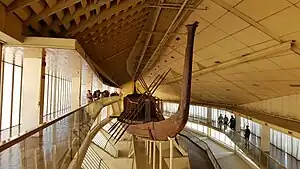
_-_013.jpg.webp)
Several ancient Egyptian solar ships and boat pits were found in many ancient Egyptian sites.[1] The most famous is the Khufu ship now preserved in the Grand Egyptian Museum. The full-sized ships or boats were buried near ancient Egyptian pyramids or temples at many sites. The history and function of the ships are not precisely known. They might be of the type known as a "solar barge", a ritual vessel to carry the resurrected king with the sun god Ra across the heavens. However, some ships bear signs of being used in water, and it is possible that these ships were funerary barges.
Comparative table of solar ships
| Name of ship(s) | Dating | Number | Discovery site | Current site | Length & width | Owner | Discovery date | Current status | Coordinates |
|---|---|---|---|---|---|---|---|---|---|
| Khufu First Solar ship | c. 2566 BC | 1 | South of Khufu pyramid, Giza | Grand Egyptian Museum, Giza | 43.6 m long & 5.9 m wide | King Khufu | 1954 by Kamal el-Mallakh | Ship pit preserved containing the wood of a ship, which was later reconstructed | 29°58′41″N 31°08′04″E / 29.97806°N 31.13444°E |
| Khufu Second Solar ship | c. 2566 BC | 1 | South of Khufu pyramid, Giza | 2nd Solar Ship pit, Khufu pyramid complex, Giza | N/A | King Khufu | 1954 by Kamal el-Mallakh & 2012 | Ship pit preserved containing wood of ship to be reconstructed | 29°58′41″N 31°08′04″E / 29.97806°N 31.13444°E |
| Hetepheres I Solar Ship | c. 2589–2566 BC | 1 | Pyramid of Hetepheres (GIa), Khufu pyramid complex, Giza | N/A | N/A | Queen Hetepheres I | N/A | Boat pit preserved | 29°58′41″N 31°08′04″E / 29.97806°N 31.13444°E |
| The Ka Solar Ship | c. 2566 BC | 1 | Pyramid of the Ka, Khufu pyramid complex, Giza | N/A | N/A | King Khufu | 1954 | Boat pit preserved | 29°58′41″N 31°08′04″E / 29.97806°N 31.13444°E |
| Other Khufu Solar ship | c. 2566 BC | 3 | East of Khufu pyramid, Giza | N/A | N/A | King Khufu | N/A | Ship pits preserved | 29°58′41″N 31°08′04″E / 29.97806°N 31.13444°E |
| Khentkaus I Solar ship | c. 2445 BC | 2 | Pyramid of Khentkawes in Giza (LG 100), Giza | N/A | N/A | Queen Khentkaus I | 1906 by Borchardt | Ship pits preserved | 29°58′41″N 31°08′04″E / 29.97806°N 31.13444°E |
| Khafre Solar Ships | c. 2570 BC | 7 | 5 around the Upper temple: 2 on north side & 3 on south; 2 in tunnels of Lower temple; Khafre pyramid complex, Giza | N/A | N/A | King Khafre | 1837 by John Perring ? | Ship pits preserved | 29°58′34″N 31°07′51″E / 29.97611°N 31.13083°E |
| Nyuserre Ini Solar ship | c. 2421 BC | 1 | Outside the temple on the south-east corner of Niuserre Sun Temple, Abo Gorab, Abusir | Boat pit preserved | N/A | King Nyuserre Ini | 1905 | Boat pit preserved | 29°54′N 31°12′E / 29.900°N 31.200°E |
| Den Solar ship | c. 2935 BC | 2 | Northern area of Mastaba number six, Abu Rawash | National Museum of Egyptian Civilization | 6 m length and 1.5 m wide | King Den | 2012 | Preserved | 30°01′55″N 31°04′30″E / 30.03194°N 31.07500°E |
| Djedefre Solar Ship | c. 2575 BC | 1 | East side of the pyramid complex of Djedefre, Abu Rawash | Louvre, France | 35 m long & ? m wide | King Djedefre, son of Khufu | 1901 | Boat pit preserved, beautiful heads carved into the likeness of Djedefre were found here | 30°01′55″N 31°04′30″E / 30.03194°N 31.07500°E |
| Neferirkare Solar Ships | c. 2483–2465 BC | 2 | North & South sides of Neferirkare pyramid, Abusir | Mentioned in a papyrus | N/A | King Neferirkare Kakai | 1904? by M. Verner | Only dust remains boat pits preserved | 29°54′N 31°12′E / 29.900°N 31.200°E |
| Neferefre Solar Ships | c. 2445 BC | 5 | Funerary temple of Neferefre, Abu Sir | N/A | N/A | King Neferefre | N/A | Boat pits preserved | 29°54′N 31°12′E / 29.900°N 31.200°E |
| Ptahshepses Solar Ships | c. 2445–2421 BC | 2 | Southern part of the complex of the vizier Ptahshepses, Abu Sir | N/A | N/A | Ptahshepses | N/A | Boat pits preserved | 29°54′N 31°12′E / 29.900°N 31.200°E |
| Hor-Aha Solar ships | c. 2775 BC | 14 | Between the Shunet ez-Zabib and the Western Mastaba, Abydos | N/A | 18–27 m long & 2.5 m wide | King Hor-Aha | 1991 | Fragile boat remains | 26°11′06″N 31°55′08″E / 26.18500°N 31.91889°E |
| Khasekhemwy Solar Ships | c. 2675 BC | 12 | Umm el Qa'ab, Abydos | N/A | 25 m long & 2.5 m wide & 0.5 m deep | Khasekhemwy | 2000 by D O'Connor | Fragile boat remains | 26°11′06″N 31°55′08″E / 26.18500°N 31.91889°E |
| Senusret III Solar ships | c. 1839 BC | 6 | Near the pyramid of Senusret III, Dashur | One in Carnegie Museum of Natural History in Pittsburgh, USA and one in the Field Museum of Natural History in Chicago, USA; two in The Sharm El-Sheikh Museum & 2 were lost? | 10–18 m long & 5.9 m wide | King Senusret III | 1893 Jacques de Morgan | Well preserved | 29°48′N 31°14′E / 29.80°N 31.24°E |
| Amenemhat III Solar ship | c. 1814 BC | 1 | South perimeter of Amenemhat III pyramid, Dashur | Decomposed | 15 m long & 5.7 m wide | King Amenemhat III | ? | Ship pit preserved | 29°48′N 31°14′E / 29.80°N 31.24°E |
| Saqqarah First dynasty Solar boats | c. 3100–2890 BC | 3 | Tomb S 3357, Saqqara | N/A | N/A | First Dynasty of Egypt kings | 1957 by W. Emory | Ship pits preserved | 29°52′17″N 31°12′59″E / 29.871264°N 31.216381°E |
| Kagemni Solar ships | c. 2345 – 2333 BC | 2 | Tomb of the vizier Kagemni, Saqqara | N/A | N/A | Vizier Kagemni | N/A | Ship pits preserved | 29°52′17″N 31°12′59″E / 29.871264°N 31.216381°E |
| Unas Solar Ship | c. 2345 BC | 2 | 150 meter from the funeral Temple of Unas Pyramid, Saqqara | N/A | 44 m long & ? m wide | King Unas | ? | Ship pits preserved | 29°52′17″N 31°12′59″E / 29.871264°N 31.216381°E |
| Tarkhan Solar ship | c. 3100–2890 BC | ? | Tarkhan (Egypt) or Kafr Ammar | N/A | N/A | First Dynasty of Egypt kings? | 1913 by Flinders Petrie | N/A | 29°30′00″N 31°13′30″E / 29.500°N 31.225°E |
| Helwan Solar ships | c. 3100–2890 BC | 5 | Tombs 762 H5, 649 H5, 1502 H2 and 680 H5), Helwan | N/A | N/A | First Dynasty of Egypt kings? | 1940s by Z Saad | N/A | 29°58′41″N 31°08′04″E / 29.97806°N 31.13444°E |
| Senusert I Solar Ship | c. 1926 BC | 1? | Pyramid of Senusret I, Lisht | N/A | N/A | King Senusret I | ? | 40 timbers preserved | 29°34′13″N 31°13′52″E / 29.57028°N 31.23111°E |
| Amenemhat I Solar ship | c. 1962 BC | 1 | Pyramid of Amenemhat I, Lisht | N/A | N/A | King Amenemhat I | ? | N/A | 29°34′13″N 31°13′52″E / 29.57028°N 31.23111°E |
Giza Necropolis
Khufu
Seven boat pits have been identified around the Great Pyramid, five of which belong to the Great Pyramid proper. The other two are associated with the pyramid of Hetepheres (GIa) and the pyramid of the Ka (GId). Khufu's boat pits are located on the eastern side of the pyramid and the southern side.[2]
Khufu First Solar ship
The Khufu ship is an intact full-size vessel from ancient Egypt that was sealed into a pit in the Giza pyramid complex at the foot of the Great Pyramid of Giza around 2500 BC. It was thus identified as the world's oldest intact ship and has been described as "a masterpiece of woodcraft" that could sail today if put into water.[3] The Khufu ship is one of the oldest, largest, and best-preserved vessels from antiquity. It measures 43.6 m (143 ft) long and 5.9 m (19.5 ft) wide.
The ship was one of two[4] rediscovered in 1954 by Kamal el-Mallakh – undisturbed since it was sealed into a pit carved out of the Giza bedrock. It took years for the boat to be painstakingly reassembled, primarily by the Egyptian Department of Antiquities’ chief restorer, Ahmed Youssef Moustafa (later known as Haj Ahmed Youssef).
The ship was housed in the Giza Solar boat museum before being moved to the Grand Egyptian Museum.[5][6]
In one of the southern boat pits a disassembled wooden barge was discovered in 1954. It has been reconstructed and resides in the boat shaped museum.[7] In 1987, the western boat pit at the Great Pyramid was examined by a microprobe inserted through a hole drilled into the pit, confirming the presence of a second wooden boat similar to the first. It was originally decided that the second boat should remain in its pit, in conditions which made its preservation near perfect.[8]
 The reconstructed "solar barge" of Khufu
The reconstructed "solar barge" of Khufu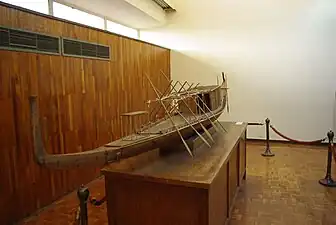 Model of the solar barge, from the boat museum
Model of the solar barge, from the boat museum Picture of discovery place of Solar boat pit covered by stones inside the Solar bark museum
Picture of discovery place of Solar boat pit covered by stones inside the Solar bark museum Solar bark of Kheops. Situation when discovered
Solar bark of Kheops. Situation when discovered Original cord discovered with the Solar boat
Original cord discovered with the Solar boat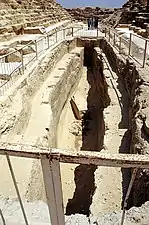 Solar Boat pit, Giza Pyramids Plateau, Egypt
Solar Boat pit, Giza Pyramids Plateau, Egypt One of the boat pits on the east of the Great Pyramid
One of the boat pits on the east of the Great Pyramid
Khufu Second Solar ship
The excavation of the second solar boat of Khufu was finished in 2021.[9] The ship will be reconstructed and displayed in the Grand Egyptian Museum.[10][11][9] Sakuji Yoshimura, a Waseda University professor who is leading the restoration project with Egypt's Antiquities Council, said that scientists discovered that one of the cover stones of the boat pit is inscribed with Khufu's name.[12]
Hetepheres Solar ship
Associated with the pyramid of Hetepheres I (GIa).[2]
Ka Solar Ship
Associated with the pyramid of the Ka (GId).[2]
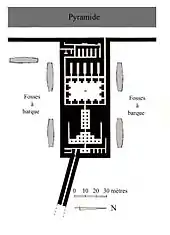
Khafre Solar ship
Khafre's pyramid has five pits that once contained funeral boats. One known boat pit is alongside the east face of Khafre's pyramid.[13] Another two of the covered boat pits of Khafre lie on the east side of the pyramid and a further covered boat pit lies on the south side of the mortuary temple of Khafre.[14]
Abu Gorab
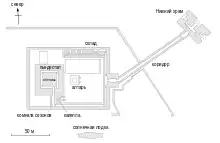
Niuserre Solar ship
A few hundred meters to the north of Abusir, about six miles southwest of Cairo is the sun temple known as Abu Gorab. There lies the ruins of Niuserre's temple, Outside the temple proper and near its southern side, the German expedition also discovered a large building in the shape of a boat. This was a pit, lined with mud bricks which was at one time plastered, whitewashed and colored. This structure was augmented with several other elements made from different materials such as wood. This structure is believed to have been purely symbolic, representing a "solar boat" in which the sun god was supposed to have floated across the heavenly ocean.[15] (The pit might have contained a boat)
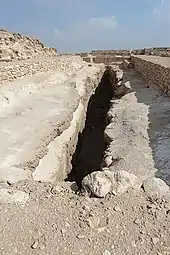
Abu Rawash
King Den Solar ship
A wooden funerary boat thought to have once belonged to First Dynasty King Den has been discovered at Abu Roash, the place of the pyramid of Khufu's son, Djedefre. Unearthed in the northern area of Mastaba number six (a flat-roofed burial structure) at the archaeological site, boat consists of eleven large wooden planks reaching six metres high and 1.5 metres wide.[16] Two boats were discovered at Abu Rawash hill M.[17] (2 boats or Ships)[18]
Djedefre Solar ship
At the complex of Djedefre, Emile Chassinat, between 1900 and 1902, discovered the remains of a funerary settlement and a boat pit.[19] The solar boat pit is situated on the east side of the pyramid. It is a ditch 35 meters long cut out of the living limestone. It is destined for the royal boat. The beautiful heads carved into the likeness of Djedefre were found there.[20]
Abusir
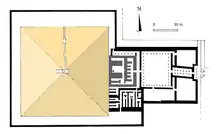
Neferirkare Solar ship
Neferirkare's pyramid at Abusir was the largest structure in the region. Large wooden boats were buried outside the pyramid in its courtyard on the north and south sides. Archaeologists discovered them by their mention in a cache of papyrus found within the mortuary temple, but unfortunately, when they excavated the southern boat pit, only dust remained of the boat itself.
Abydos

The Abydos ships have the honor of being the world's oldest planked boats.
Hor-Aha Solar ships
In 1991, in the desert near the temple of Khentyamentiu near Abydos, archaeologists uncovered the remains of the fourteen ships dating back to the early first dynasty (2950–2775 BC), possibly associated with Hor-Aha. These 75-foot-long (23 m) ships are buried side by side and have wooden hulls, rough stone boulders which were used as anchors, and "sewn" wooden planks. Also found within their desert graves were remains of the woven straps that joined the planks, as well as reed bundles that were used to seal seams between planks.[18]
Abydos had at least a dozen boat graves[21] adjacent to a massive funerary enclosure for the late Dynasty II (ca. 2675 B.C.) Pharaoh Khasekhemwy.[22][23] Their age should be more than 400 years older than Khufu's (Cheops)[17] Ships were 25 meters long, 2.5 meters wide and about 0.5 meters deep, seating about 30 rowers. They had narrowing sterns and prows and they were painted.[24] They are in meaning and function the direct ancestors of the boat recovered at Khufu's Great Pyramid at Giza[23][25] The ships are possibly associated with King Aha, the first ruler of that dynasty.[26] The length of the structures varied from nearly 20 to 27m.[27]
These are the world's most ancient planked hulls. The traditions of the hull construction seen in all the excavated vessels continued through the end of the sixth century BC and, with the substitution of nails for mortise-and-tenon joints, into the present. An abandoned freighter, stripped of its internal timbers and left on a small branch of the Nile near Mataria (ancient Heliopolis, north of modern Cairo) provides the first instance of pegged mortise-and-tenon joints in an Egyptian hull. Not all joints were through-fastened, and the pegs, or treenails, may also have fastened frames to the hull, but for this marks a dramatic departure from previous shipbuilding techniques.[28]
Dahshur
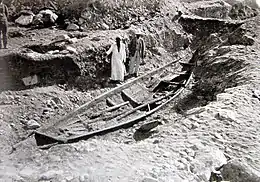
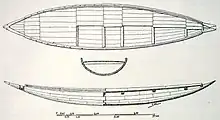
Senusret III Solar ships
Six boats, known as the Dahshur boats dating from the Middle Kingdom were found at Dahshur. They are about 10 m long each.[17] In 1893, French archaeologist Jacques de Morgan discovered six boats near the Middle Kingdom pyramid of Senusret III at Dashur.[8] He made drawings and measurements of only one boat (the White boat) from the cache at Dahshur.[29] One of the ships measure 18 meters.[30]
Excavations conducted in 1894 and 1895 by de Morgan at the funerary complex of Senusret III on the plain of Dahshur revealed five or six small boats. Today, only four of the "Dahshur boats" can be located with certainty; two are in the United States, one in the Carnegie Museum of Natural History in Pittsburgh and one in the Field Museum of Natural History in Chicago. The remaining two were on display in the Cairo Museum, but were relocated to the Sharm El-Sheikh Museum in 2020.[31][32]
Since their excavation these boats remained relatively inconspicuous until the mid-1980s when a study of the two hulls in the United States was conducted.[31]
Amenemhat III Solar ship
The Ship pit was discovered at the south perimeter of his pyramid, it measured 15 meter by 5.57 meters.[30]
Saqqara
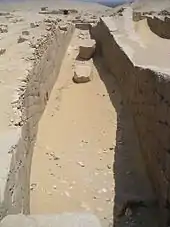
Mastabas
A 'model estate' and funerary boat was found at Saqqara by W. Emery (in 1957–58; tomb S 3357, 3 ships).[17][18] At least 3 mud-brick boat graves were associated with First Dynasty rulers and high-ranking officials.[25]
Unas Solar ship
The Pyramid of Unas in North Saqqara has two boats.[33] One the boat pits is 44 meter long and is located 150 meter away from the remains of the funeral temple. Lined with limestone blocks these boat pits are thought to have been simulacra of solar boats.[34]
Tarkhan
Remains of Old Kingdom boats were found at Tarkhan[35] (at least one boat)[24][25]
Helwan
Archaic boats had been found at Helwan by Z. Saad.[17] (4 Ships)[18] In total 4 or 5 boat burials were found at Helwan, 2 at Abu Roash Hill M, and finally others at the northerly Abydos site of the Royal enclosures, near those just found.[17]
Lisht
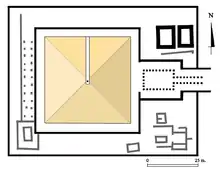
Senusret Solar ship
Forty timbers were found in excavations near the Pyramid of Senusret I in Lisht. They were identified as part of vessel or vessels.[36]
Amenemhat I Solar ship
A mudbrick boat pit has also been found outside Amenemhat I’s pyramid western perimeter wall.[37]
Other ancient Egyptian ships
Excavation of the remains of seagoing ships at Wadi/Mersa Gawasis, south of Safaga on the Egyptian Red Sea coast, in 2004–05 and 2005–06 provides extensive physical evidence for construction techniques, wood selection, and recycling and re-use practices of the ancient Egyptians. Discoveries at Gawasis prove that common Egyptian river-oriented design and construction techniques were successful both on the Nile and at sea.[38][39]
See also
References
- ↑ Vinson, Steve (1994). Egyptian boats and ships. Princes Risborough, Buckinghamshire, UK: Shire Publications. ISBN 0-7478-0222-X.
- 1 2 3 "Fig 32". Electromagnetic Sounder Experiments at the Pyramids of Giza.
- ↑ "THE ROYAL SHIPS OF THE EGYPTIAN PHARAOHS". Archived from the original on 2012-01-27. Retrieved 2012-01-27.
- ↑ "Egypt Excavates Ancient King's 4,500-Year-Old Ship". Fox News. Associated Press. 23 June 2011. Archived from the original on 26 June 2011. Retrieved 25 June 2011.
Archaeologists have begun excavating a 4,500-year-old wooden boat found next to the Great Pyramid of Giza, one of Egypt's main tourist attractions, Egypt's top antiquities official said Thursday.
- ↑ "A team from the Grand Egyptian Museum succeeded in the first trial run conducted to test the vehicles that will be used in the transferring the first Khufu Solar Boat from its current location". Archived from the original on 2021-08-06.
- ↑ "In pictures: Egypt pharaoh's 'solar boat' moved to Giza museum". BBC News. 2021-08-07. Retrieved 2021-08-07.
- ↑ "Khufu boat pits". egyptphoto.ncf.ca. Retrieved 2018-02-24.
- 1 2 "ANCIENT EGYPTIAN SOLAR BOAT LAND OF THE PHAROAHS SOLARLADY FIGURE HEAD SUN GOD RA HAWKS HEAD KHUFU HORUS OSIRUS". www.solarnavigator.net. Retrieved 2018-02-24.
- 1 2 "First Phase of extracting, restoring Second Khufu Ship completed". EgyptToday. 2020-08-09. Retrieved 2021-12-18.
- ↑ "早稲田大学エジプト学研究所". www.egyptpro.sci.waseda.ac.jp (in Japanese). Retrieved 2018-02-24.
- ↑ "Scholars will reassemble ancient Egyptian boat". www.chinadaily.com.cn. Retrieved 2018-02-24.
- ↑ Yoshimura, Sakuji; Kurokochi, Hiromasa (2013). "Research Report: Brief Report of the Project of the Second Boat of King Khufu". Journal of Ancient Egyptian Interconnections. 5–1: 85–89.
- ↑ "Electromagnetic Sounder Experiments at the Pyramids of Giza". www.ldolphin.org. Retrieved 2018-02-24.
- ↑ "Applications of Modern Sensing Techniques to Egyptology". www.ldolphin.org. Retrieved 2018-02-24.
- ↑ Kinnaer, Jacques. "The Ancient Egypt Site". www.ancient-egypt.org. Retrieved 2018-02-24.
- ↑ "First Dynasty funerary boat discovered at Egypt's Abu Rawash – Ancient Egypt – Heritage – Ahram Online". english.ahram.org.eg. Retrieved 2018-02-24.
- 1 2 3 4 5 6 "Francesco Raffaele Egyptology News". xoomer.virgilio.it. Retrieved 2018-02-24.
- 1 2 3 4 "Helwan (Heluan)". xoomer.virgilio.it.
- ↑ "Could Djedefre's Pyramid be a Solar Temple? Not According to New Research by Baud". 2012-05-11. Archived from the original on 2010-05-14. Retrieved 2022-02-01.
- ↑ "Abu Rawash boat pit". egyptphoto.ncf.ca. Retrieved 2022-02-01.
- ↑ Cheryl A. Ward. "Sewn planked boats from Early Dynastic Abydos, Egypt" (PDF). Archived from the original (PDF) on 2010-06-30. Retrieved 2012-12-25.
- ↑ "Welcome". www.digitalegypt.ucl.ac.uk. Digital Egypt for Universities. 2000–2003. Retrieved 2018-02-24.
{{cite web}}: CS1 maint: others (link) - 1 2 Archaeology, Nordic Underwater. "Abydos royal boats". www.abc.se. Retrieved 2018-02-24.
- 1 2 3 Cheryl Ward. "Boat-building and its social context in early Egypt: interpretations from the First Dynasty boat-grave cemetery at Abydos" (PDF). Archived from the original (PDF) on 2010-06-30. Retrieved 2012-12-25.
- ↑ "Ancient Egyptian Boats". www.articlesfactory.com. Retrieved 2018-02-24.
- ↑ "Abydos Royal Enclosures (Kom es-Sultan) Early Dynastic Egypt period". xoomer.virgilio.it. Retrieved 2018-02-24.
- ↑ "The Promise of Egypt's Maritime Legacy". www.adventurecorps.com. Retrieved 2018-02-24.
- ↑ Creasman, Pearce Paul. "Dovetails or Lashings: A Case Study in Middle Kingdom Ship Construction (The Cairo Dahshur Boats)". allacadaemic.com. Archived from the original on 2014-09-03.}
- 1 2 The Pyramid Complex of Senwosret I by Dieter Arnold, Page 53
- 1 2 "The Cairo Dahshur Boats, a Digital Exhibit". cairodahshur.imrd.org. Retrieved 2018-02-24.
- ↑ "Sharm El-Sheikh Museum receives King Senusret III boats from Egyptian Museum in Tahrir". EgyptToday. 2020-06-02. Retrieved 2021-12-18.
- ↑ "Development of the Ancient Egyptian Royal Mortuary Complex". www.guardians.net. Retrieved 2018-02-24.
- ↑ "Photo of the Week – Unas Boat Pit". Pyramid Texts Online. Archived from the original on January 5, 2011.
- ↑ "רשפים- קהילנט". www.reshafim.org.il.
- ↑ Dieter Arnold (1992). The Pyramid Complex of Senwosret I (PDF). p. 52. Archived from the original (PDF) on 2010-06-30.
{{cite book}}:|website=ignored (help) - ↑ "el-Lisht Necropolis". Egyptian Monuments. 2009-02-26. Retrieved 2018-02-24.
- ↑ Cheryl Ward. "Evidence for Pharaonic Seagoing Ships at Mersa/Wadi Gawasis, Egypt" (PDF). Archived from the original (PDF) on 2010-06-30. Retrieved 2012-12-25.
- ↑ "Harbor of the Pharaohs to the Land of Punt" (PDF). Archived from the original (PDF) on 2010-06-30. Retrieved 2012-12-25.
Further reading
- Nancy Jenkins – The boat beneath the pyramid: King Cheops' royal ship (1980) ISBN 0-03-057061-1
- Paul Lipke – The royal ship of Cheops: a retrospective account of the discovery, restoration and reconstruction. Based on interviews with Hag Ahmed Youssef Moustafa (Oxford: B.A.R., 1984) ISBN 0-86054-293-9
- Björn Landström – Ships of the Pharaohs: 4000 Years of Egyptian Shipbuilding (Doubleday & Company, Inc., 1970) Library of Congress Catalog Card number 73-133207
External links
- NOVA Online | Mysteries of the Nile | March 6, 1999: The Solar Barque The Solar Barque, Nova Online
- Web archive backup: Ships of the World: An Historical Encyclopedia – "Cheops ship"
- The Giza Mapping Project
- A Visitors Perspective of the Khufu Boat Museum